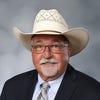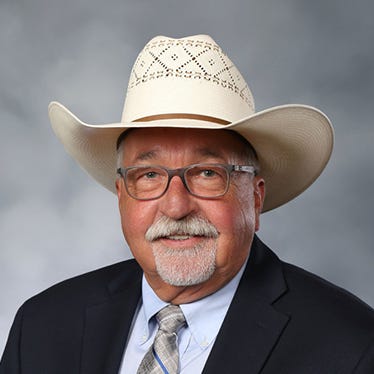June 24, 2019

We had three sets of twin calves born this past calving season, and the percentages of luck with twins played out about normal; one pair were both claimed and raised by the mother, one pair died shortly after birth, and the last pair resulted in the mother only claiming one of the calves.
It was fortunate I even found the abandoned heifer calf on my afternoon check. I saw a small black dot at the edge of one pasture, near the timberline, and drove over to see about it. What I found was a tiny calf too weak to even stand. With most of the cows within a hundred yards, I used my distressed calf noise to see if any of the cows would respond. About a dozen had already calved, and they immediately ran to their calves. None came to this newborn, so I drove through the herd and identified one cow that had given birth the day before to an unusually small bull calf. I was sure it was the birth twin to the newly found little heifer.
My wife, Judy, was with me, so she drove the UTV while I cradled the critter in my arms and we drove to the suspected mom, but she wanted nothing to do with the calf. We took it home with us to let Nurse Judy work her magic. Not only was the calf weak from her first day and a half without nutrition, but we also soon determined that she was both blind and deaf. Judy named her Helen.
For the next two weeks, my wife did everything in her power to keep the baby calf alive, including feeding with a stomach tube for the first three days until she garnered enough strength to stand. Judy would also massage Helen’s muscles and brush her hair to simulate what should have been her own mother’s licking and care. A deep layer of fresh straw in the barn kept her warm during the cold February nights, and there were a few nights when Judy covered her with a blanket for added warmth.
By the third week, Helen was healthy, vigorous and much like any other calf, with the exception of not having a cow momma. She had also regained some vision and hearing, but contrary to every baby calf I had ever raised, the little critter never learned how to suck — she simply chomped at the bottle nipple. I cut an extra-large hole in the end so the milk would flow out easily, but it still took her 10 minutes to consume the contents of the bottle that a normal calf would have devoured in three minutes.
In early May, Judy turned the calf out in the pasture by our house, but every morning and evening she would go to the yard fence and yell, “Helen!” The little calf would come running to chomp on the nipple and eat her meal. This continued for about a month, and then Judy told me one day that Helen had finally grasped the concept of sucking. Within a week, Helen would no longer come to Judy’s call, and I observed that the newly acquired skill had allowed the former bottle baby to start robbing from any and all of about 30 mothers in the pasture.
Judy was happy for Helen in one way, but sad that she no longer needed her surrogate mother. As a matter of fact, one afternoon, all the cattle were close to the house and Helen was 10 feet away from the spot where Judy had fed her for so long. When she called out Helen’s name, the little calf turned her back to my wife, as if she didn’t want the other calves to know she had once been friends with that “human.”
My wife commented that Helen was no different than our own sons. “When they reach adolescence, who wants to be seen with their parents?”
Crownover lives in Missouri.
About the Author(s)
You May Also Like






